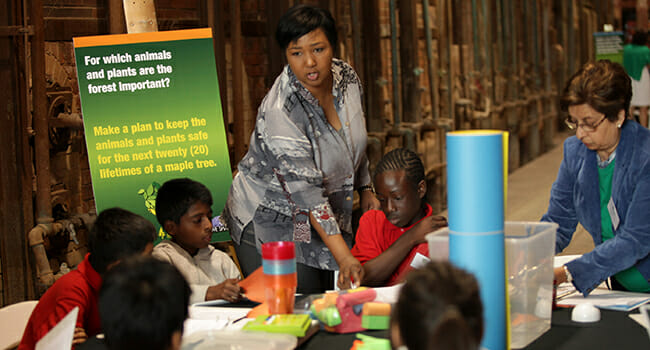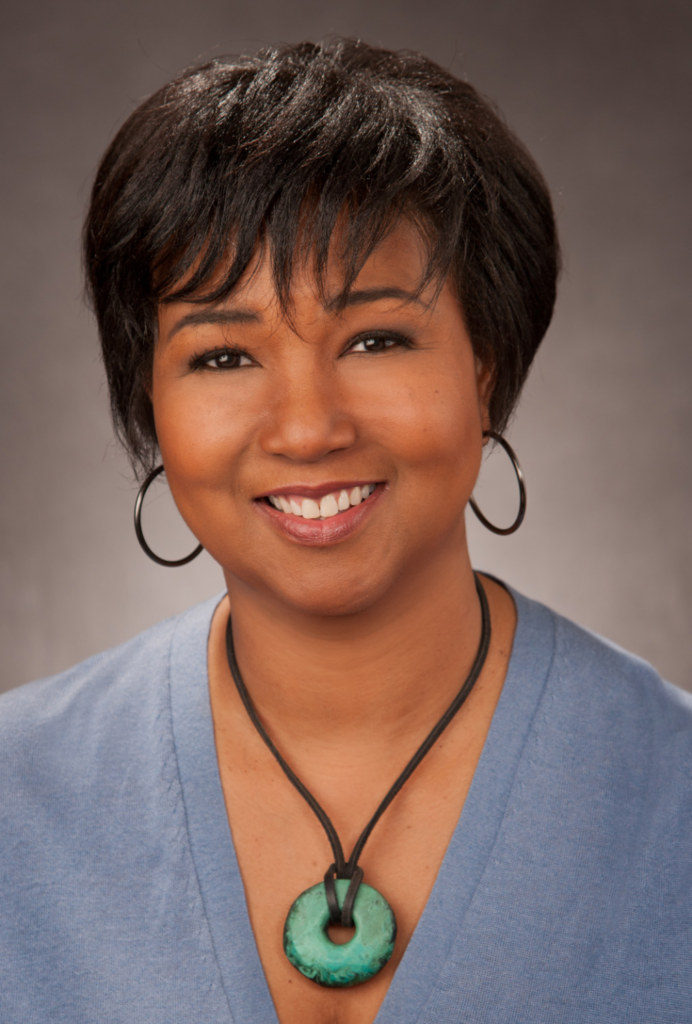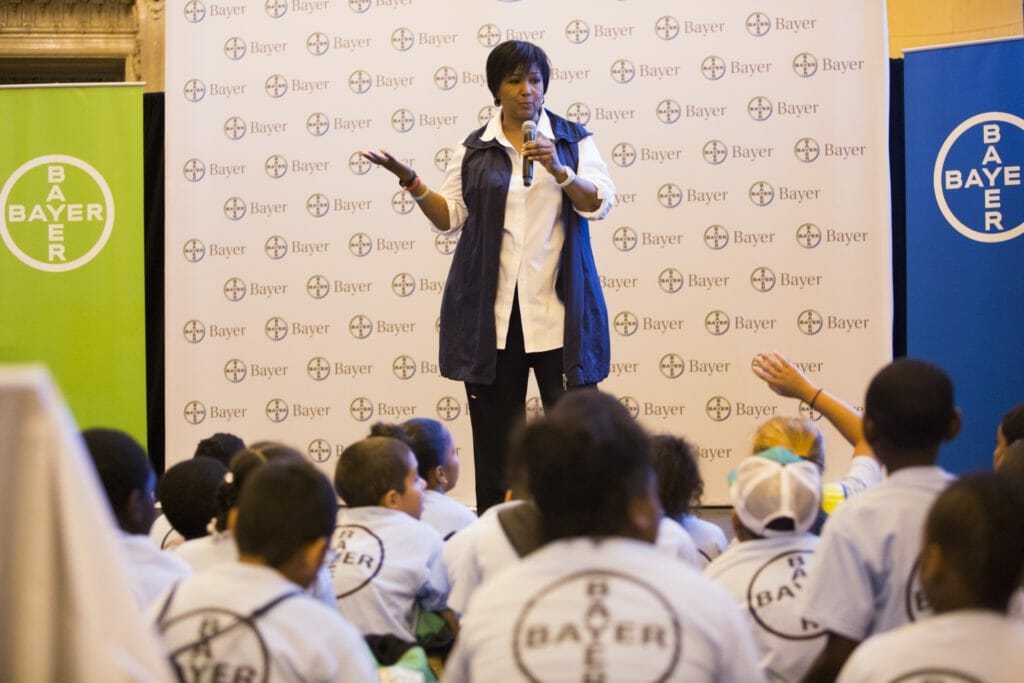Former Astronaut Dr. Mae Jemison Empowers Youth to Explore, Connect with the World Through STEM Education

Meet Daily Point of Light Award honoree Dr. Mae Jemison. Read her story and nominate an outstanding volunteer, family or organization as a Daily Point of Light.
Dr. Mae C. Jemison, the world’s first woman of color to go into space, served six years as a NASA astronaut. She flew aboard the Space Shuttle Endeavour and was NASA’s first science mission specialist, performing experiments in material science, life science and human adaptation to weightlessness. Prior to NASA, Dr. Jemison served as a Peace Corps medical officer in Sierra Leone and Liberia; Her international experience also includes time spent working in a Cambodian refugee camp, and with the Flying Doctors of East Africa.

Acting on her passion for science literacy, Dr. Jemison founded the Dorothy Jemison Foundation for Excellence in 1994. Through the foundation, she launched an international science camp called The Earth We Share™ to engage youth in hands-on, interdisciplinary STEM education.
We sat down with Dr. Jemison to learn more about her work, and what inspires her to serve.
What inspires you to volunteer?
I believe everyone has an obligation to contribute actively in society to their ability – and that contribution does not always have to be in the form of paid compensation. Frequently, the non-monetary rewards are of incalculable value, and I’ve been at it since I was a child – really a busy body that was curious and willing to help. Throughout my career, I’ve noted how many things are interconnected – science, society, technology, politics and social welfare. Though I went to medical school to pursue biomedical engineering after graduating with a degree in chemical engineering, while there, I became fascinated with health care in very difficult settings of the developing world. I spent time volunteering in a Cambodian refugee camp in Thailand. I joined the Peace Corps as the area medical officer in Sierra Leone and Liberia to get more experience in development. Since leaving NASA, I’ve worked to develop and research technologies that were specifically designed for the social, political and economic needs of individuals and circumstances worldwide, especially the developing world. I now devote a lot of time to ensuring that all races, ethnicities, genders and social classes are represented in the scientific community – emphasizing that we create the future.
Describe your volunteer role with The Earth We Share.
I founded TEWS in 1994 with the objective to build a curriculum to bolster the science literacy of all students and help them to appreciate their connection with the world around them. Fundamentally, the goal was to actively engage students such that they never had to ask the question, “What does this have to do with me?” The answer is an experiential curriculum that takes advantage of the “superpowers of adolescence” – curiosity, the need to declare independence and do something special on their own, combined with the unique positives of not wanting to let their peers down. We tackled 12- to 16-year-olds, the age at which many students typically drop science and tech fields as career options. I believe that the most important things one gets from a science education are critical-thinking and problem-solving skills. The TEWS Discovery Method teaches students “how to think” while they gain a wealth of information. So, students seek solutions to global dilemmas such as “how many people can the Earth can hold?” and “design the world’s perfect house” and “predict the hot public stocks of the year 2030.” The initial camps were four-week residential programs, but we have evolved to hold day camps and one-week, non-residential summer programs. The most important aspect is that we train teachers who return to their classrooms armed with new, tried teaching methods. My role has been chief curriculum developer – training teachers and trainers, and advocating to evolve the methodologies and applications.

Why do you think it’s important for others to give back?
All of us – educators, parents, teachers, school boards, governments and society at large – have a role to play in advancing humanity. But it isn’t just about getting a seat at the table – it’s about what you do with the opportunity when you get that seat. What difference does it make if you have a place at the table and you mind your table manners and act like everyone else? We all need to bring our unique experiences and perspectives to bear.
Can you share a favorite story that highlights the impact of your work and your foundation?
I founded the Dorothy Jemison Foundation for Excellence in honor of my mother. Our work is modeled around her teaching principles and life accomplishments. My mother was a highly effective, dedicated educator for over 25 years in some of the most difficult schools in the Chicago public school system. She believed that each person can and should be expected to achieve a level of excellence that allows a unique contribution to society. The foundation works to capture and implement the caveats of excellence – my mother advocated and translated them into programs to enhance achievement and individual excellence throughout the world. Our return on investment is the creation of a workforce society that understands and appreciates other nations, cultures and societies. Interestingly enough, one of my current employees attended a TEWS camp as a 12-year-old, came back as college intern and after really impressive accomplishments in international relations, working overseas and on the trading floor, she is back helping get the next generations involved.
Are there any future partnerships, programs, or events that you are excited about?
Currently, my work includes 100 Year Starship, a global initiative to ensure the capabilities for human interstellar travel, beyond our solar system to another star, exists within the next century – not a mission date, but the capabilities. Why? Because I believe that pursuing an extraordinary tomorrow creates a better world today. And all the capabilities required for a successful interstellar journey mirror the capabilities needed to survive as a species on this planet. My task: get as many people not directly working in space exploration to contribute to and benefit from the potential of tackling such a difficult, but awe-inspiring challenge. In September, we will hold 100YSS NEXUS, bringing together the wealth of human experience. And for more than 20 years, I’ve proudly served as the science literacy advocate for Bayer’s national Making Science Make Sense initiative. Together, we are currently working to provide 1 million hands-on science experiences to students by 2020.
What do you want people to learn from your story?
Each of us is just as important to the universe as any speck of stardust. Don’t let anyone rob you of your imagination, your creativity or your curiosity. It’s your place in the world. Go on and do all you can with it.
